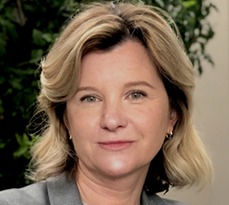How one Cambridge MBA’s experience in 2008 reveals lessons for MBAs of today: for Marina Maslowski Marsat (MBA 2008), embarking on the Cambridge MBA just as the global financial crisis broke in 2008 was a new challenge she hadn’t anticipated.

“When we first join an MBA programme, we have ideas of what we want and how to get there. Yet, through no fault of our own, the world changes. Change is hard.”
A personal career journey

Russian born Marina Maslowski came to Cambridge as a single parent with an 11-year-old daughter. She started her MBA year just as the global financial crisis broke in 2008.
“For us, the crisis had unfolded during our first week of studies in September of 2008. What we saw was an immediate reduction of recruitment efforts in the autumn of 2008, and great uncertainty around recruitment in general across 2009.
“Many people start an MBA in anticipation of holding several job offers by the time they finish. Yet, in the spring 2009 the world economies were in deep recession and two of the biggest industries for MBAs – finance and consulting – had halted all their hiring efforts altogether.
“It wasn’t until late spring in 2009 that we had all had some time to adjust to the new reality, and many of us had revised our future employment and career plans post-MBA.”
“My personal circumstances at the time of my studies in Cambridge were, perhaps, more challenging than that of my classmates.
“I was a single parent to an 11-year-old daughter. I was also self-funded, so the financial crisis and the possibility of not finding work were extra stressful for me at the time. I didn’t have any family to go back to either.”
As Marina reviewed and revisited her career plans across her MBA year, she had other factors to consider.
“I was in the UK with no permission to work after my studies, and I was well into my consumer banking career, which I wanted to change.
“I had to consider that I could only move to an English-speaking country after my MBA. I was concerned that my daughter would struggle to attend school otherwise.
“As (private) secondary education in the UK proved to be too expensive, I ended up moving to California, USA. As a result, I have lived through the rise of tech startups in the Silicon Valley.”
Be fearless
“Our class were fearless as they had nothing to lose. “
She explains, “We had classmates changing their plans, and moving to countries which they had not considered before – taking risks.
“By the end of the year we had 16 startups that originated from the Cambridge MBA Class of 2008.
“The concrete skillset of an MBA – the knowledge of strategy, frameworks, accounting and the other subjects, taught during the course, should not be underestimated. For me, the experience of spending a year with a really smart, funny, and friendly group of people gave me both a renewed perspective and confidence.”
After securing a consulting opportunity in life sciences at Roche, she moved to California, learning the industry there. She joined a biotech startup in 2011, led a successful global launch of a major breakthrough therapy, followed by a subsequent merger with Genentech, and is now Head of Global Commercial Operations in immuno-oncology/cell therapy.
Marina is also a founder of an advisory services consultancy, providing technology roadmaps for startup biotechs in commercialisation of the personalised medicine therapies in rare diseases, oncology, and autoimmune disorders.
“A year at CJBS gave me confidence, and I now believe that there is nothing I cannot do, professionally.”
Develop your network, build relationships
Cambridge Judge Business School gave Marina a wealth of contacts and connections, many of which were outside of the MBA year group.
“I have friends who graduated two years before me, and I am still in touch with CJBS alumni that came seven years after me.
“Compared to alumni networks I know from other business schools; it seems to me that some other schools focus on very formal networking only. Some don’t seem to stay in touch with each other at all.
“Contacting a Cambridge Judge alumni is like calling a family member. They will go out of the way to help you, and it doesn’t matter that you have never met.
“I can still spot a Cambridge MBA a mile off – they may not appear immediately similar, but after a while you will uncover that they all have international experience and they are immensely curious about the world. They are independent, lead with initiative, and they are brilliant yet humble too.”
Building resilience in a crisis
How do you build resilience and make opportunities during times of uncertainty?
“When we first join an MBA programme, we have ideas what we want and how to get there.
“Yet, through no fault of our own, the world changes and change is hard.
“Perhaps, this is the time to rethink your plans, and see what would make you feel happy in the long term.”
She continues, “The specifics of the jobs may have changed, but the opportunities are there.
“‘Recruiters are still looking for talent, networking still works, and, strangely, there is still venture money around.”
Marina accepts that it is hard to be creative under stress.
“So perhaps take a slightly philosophical stance and observe what is happening in the world, and where your place in it may be.”
She adds that, “People show their true nature under stress. Countries, apparently, also show their true nature under stress.
“If you were dreaming about changing geography, take another look at your dream destination, and make sure that this country’s values are in alignment with your personal values, and if this is something that is still appealing to you.
“Overall, the stock market is high, and angel investors are still funding the startups that are well-adapted to the changed environment. History tells us that many of the most successful startups were founded during recession. Crisis creates innovation.”
The best approach now would be to align your own career aspirations to our changed economy.
I cannot see that there is less need for smart people.
Marina Maslowski Marsat (MBA 2008)

